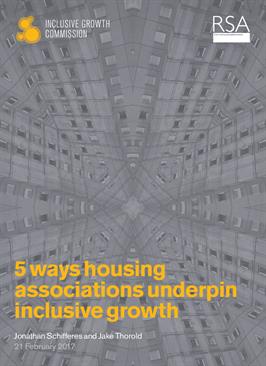Concluding in March 2017, the RSA Inclusive Growth Commission is identifying practical ways to make local economies across the UK more economically inclusive and prosperous. With the support of the National Housing Federation, we are particularly interested in the role and potential of the housing sector in inclusive growth.
The Commission argues that investment in social infrastructure should be on par with physical infrastructure in investment and policy decisions, and indeed social infrastructure is an important condition for growth.
This summary paper outlines five key areas in which housing associations can and do support inclusive growth, within the context of wider housing market conditions which vary considerably across localities in England (where NHF members operate) and other UK nations. It is informed by research undertaken by the Commission, by representations to our recent call for evidence, and by contributions made by over 30 experts who attended a roundtable on 7 February 2017 at the RSA. Together, this evidence makes clear that housing associations are a core element of the social infrastructure of local economies.
With NHF, our shared aspiration is that housing associations are better equipped to influence the inclusive growth agenda, nationally and in their localities. Specifically, housing associations:
• Manage and maintain homes to allow low pay households to participate in local economies.
• Help tenants and residents make their most productive contribution to the economy.
• Maximise inclusive economic growth within their organisations.
• Support the most vulnerable in society to live independently.
• Build substantial new affordable housing and new market housing.
Download '5 ways housing associations underpin inclusive growth' (PDF, 1.6MB)
pdf 1.6 MB
